上海市牛津版英语6Bunit10知识点总结梳理
牛津英语六年级期末考试知识点梳理Unit 6—Unit 10

牛津英语六年级期末考试知识点梳理(unit 6—unit 10)Unit 6 Going to school1.live near school /live far away from school2.by bus = go by bus by ferry = go by ferryby underground = go by undergroundgo to school on foot = walk to school3.It takes sb. some time to do sth. 某人花多少时间做某事It takes him about ten minutes to get there. 他花大约十分钟到那里。
How long does it take him to get there?4.sb. spend some time (in) doing sth. 某人花多少时间做某事spend twenty minutes travelling to school = spend twenty minutes in travelling to school花费大约二十分钟去学校It takes him about ten minutes to travel to school every day. = He spends about ten minutes (in) travelling to school every day. 他每天花费大约二十分钟去学校。
cost 花费(指花钱,以物作主语)sth. cost sb. timespend 花费(指花钱,时间,以人作主语)sb. spend …on sth. 花钱买某物pay 花费(指花钱,以人作主语) sb. pay… for sth. 花钱买某物The watch cost Tom 3000 yuan. =Tom spent 3000 yuan on the watch. =Tom paid 3000 yuan for the watch. 汤姆花3000块买了块手表。
(完整版)上海版牛津英语六年级下册6B重点知识点复习整理(最新整理)

(完整版)上海版牛津英语六年级下册6B重点知识点复习整理(最新整理)上海版牛津英语六年级下册6B重点知识点复习整理Module 1 City LifeUnit 1 Great cities in Asia【知识点梳理】1.方位词:east / west / north / south / north-east / north-west / south-east / south-west用法:a. 两地不相邻: e.g. A is north B. (= to the south of)b. 两地接壤: e.g. A is on the north of B.c. 所属关系,A包含B, B属于A: e.g. B is in the north of A.2. by + 交通工具表示“乘……交通工具”, 用how进行提问e.g. by bus / ferry / train / ship / underground… by plane = by air, by ship = by sea3. How far…多远(询问距离的远近,路程的长短)e.g. Hoe far is it from your home to school? 从你家到学校有多远?4. How long…多长,多久(询问时间的长短,提问一段时间)e.g. How long does it take to travel from Shanghai to Beijing by train? 坐火车从上海到北京要花多长时间?5. It takes (sb.) some time to do sth. 做某事需要花费多少时间e.g. It takes me five hours to make this modal plane. 做这个模型飞机花了我5个小时。
6. like / love / enjoy doing sth. 喜欢做某事e.g. The people in Bangkok like / love / enjoy eating spicy food. 曼谷人喜欢吃辛辣食物。
上海六年级下学期英语知识点oxford 6BM3U10
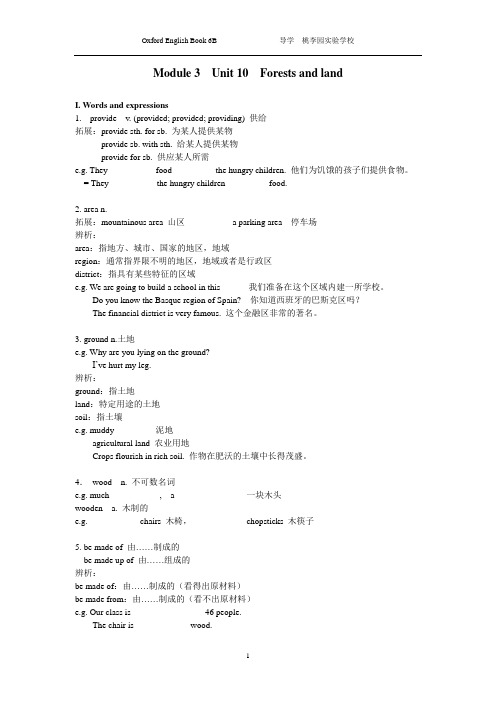
Module 3 Unit 10 Forests and landI. Words and expressions1.provide v. (provided; provided; providing) 供给拓展:provide sth. for sb. 为某人提供某物provide sb. with sth. 给某人提供某物provide for sb. 供应某人所需e.g. They __________ food _________ the hungry children. 他们为饥饿的孩子们提供食物。
= They __________ the hungry children _________ food.2. area n.拓展:mountainous area 山区 a parking area 停车场辨析:area:指地方、城市、国家的地区,地域region:通常指界限不明的地区,地域或者是行政区district:指具有某些特征的区域e.g. We are going to build a school in this ______我们准备在这个区域内建一所学校。
Do you know the Basque region of Spain? 你知道西班牙的巴斯克区吗?The financial district is very famous. 这个金融区非常的著名。
3. ground n.土地e.g. Why are you lying on the ground?I’ve hurt my leg.辨析:ground:指土地land:特定用途的土地soil:指土壤e.g. muddy _________泥地agricultural land 农业用地Crops flourish in rich soil. 作物在肥沃的土壤中长得茂盛。
4.wood n. 不可数名词e.g. much ___________, a ________________一块木头wooden a. 木制的e.g. ___________ chairs 木椅,___________ chopsticks 木筷子5. be made of 由……制成的be made up of 由……组成的辨析:be made of:由……制成的(看得出原材料)be made from:由……制成的(看不出原材料)e.g. Our class is ________________ 46 people.The chair is ____________ wood.Paper is ___________ wood.6. find out 查明;弄清楚辨析:look for:强调寻找的动作find:强调一种客观结果,意为“找到”find out:指主观有意识的动作,意为“查明真相;弄清楚”e.g. I ____________________ the pen I lost yesterday. 我在找我昨天丢的钢笔。
上海牛津版英语六年级下册6BUnit10U10同步讲义

学员编号:年级:课时数:学员姓名:辅导科目:英语学科教师:授课类型TUnit10(牛津6下)基础知识梳理教学目标1、使学生能够基本掌握牛津6年级下册Unit10中的基础词汇及重要句型;2、使学生对本单元的知识点会综合运用并掌握相关试题的解题方法。
星级★★★授课日期及时段T同步-U10基础知识梳理(建议2-5分钟)A forest is a large area of trees.Forests are very important.Birds make their nests intrees.Small animals and insectsbuild their homes in thehollows of the trees.People in poor countries burn wood as fuel.We cut down trees to make furniture andpaper.除了上面的,森林和土地还有什么作用呢,让我们继续往下看吧~~(建议20-25分钟)一、词汇Words1. forest n. 森林e. g. -Forests are home to many animals and plants.森林是许多动植物的家园。
-We must take care of our forests.我们必须爱护我们的森林。
批注:forest是可以用复数的,提醒学生注意课文标题,forests and land2. hollow n.凹地,穴,洞e. g. the hollow of the hand手心the hollow of the tree树洞3. area n.地区;区域e. g. We are going to build a school in this area.我们准备在这个区域内建一所学校。
In some areas, there are small schools for a few farm families, and the children walk to school.有些地区,设有小规模的学校为少数几个农民家庭服务,孩子们走着去上学。
牛津上海版英语六年级第一学期 Unit6 —— Unit10 语言点归纳
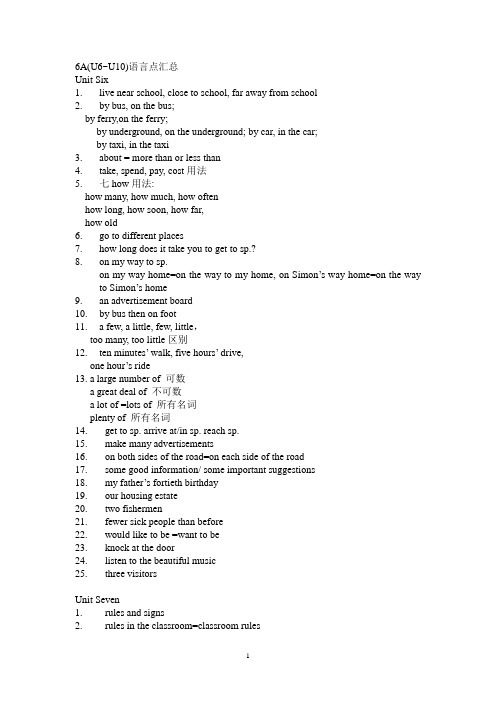
6A(U6~U10)语言点汇总Unit Six1.live near school, close to school, far away from school2.by bus, on the bus;by ferry,on the ferry;by underground, on the underground; by car, in the car;by taxi, in the taxi3.about = more than or less than4.take, spend, pay, cost用法5.七how用法:how many, how much, how oftenhow long, how soon, how far,how old6.go to different places7.how long does it take you to get to sp.?8.on my way to sp.on my way home=on the way to my home, on Simon’s way home=on the way to Simon’s home9.an advertisement board10.by bus then on foot11. a few, a little, few, little,too many, too little区别12.ten minutes’ walk, five hours’ drive,one hour’s ride13. a large number of 可数a great deal of 不可数a lot of =lots of 所有名词plenty of 所有名词14.get to sp. arrive at/in sp. reach sp.15.make many advertisements16.on both sides of the road=on each side of the road17.some good information/ some important suggestions18.my father’s fortieth birthday19.our housing estate20.two fishermen21.fewer sick people than before22.would like to be =want to be23.knock at the door24.listen to the beautiful music25.three visitorsUnit Seven1.rules and signs2.rules in the classroom=classroom rules3.rules in the library= library rules4.rules in the park=park rules]5.rules in the street/on the road=traffic rules6.walk on the grass7.leave rubbish8.not eat or drink9.wait for the green man10.keep quiet11.listen to our teachers carefully12.draw on our desks13.walk across the road= cross the road14.pick the flowers, pick up the rubbish15.turn left/right=turn to the left/right16.talk loudly17.in the shopping center18.an escalator19.enter the centre20.on the right of sth. On the left of sth.e the one on the left/ in the middle22.obey/keep/follow the rules, break the rules23.chase each other24.be late for school25.go upstairs/downstairs=go up/down the stairs26.at the crossing27.at the entrance to sp.28.What’s the meaning of this word=What does this word mean?29.enter the room=go into the room30.at the traffic lights31.decide to do sth32.write an invitation to sb33.look for sth to eat34.tell lies35.be angry with sb/ be angry at sth36.anger/angry, hunger/hungry37.see leaves falling from the trees38.see sb doing sth, hear sb doing sth39.on Children’s Day40.be friendly/kind to sbUnit Eight1.would like sth for dinner2.steamed food/ fried food/ boiled food/ baked food3.steamed prawns with garlic4.tomato and egg soup5.fried eggs with bacon6.have some fruit7.need to do sth, don’t need to do sth, don’t have to do sth, needn’t do sth; don’tneed anything8.fried cabbage9.fried chicken wings10.steamed fish11.chicken soup12.steamed eggs with meat13.boiled eggs14.the prices of food15. a high/low price,a big/small vocabulary16.at the fish/vegetable/fruit/meat stall in the market17.in the fish/vegetable/fruit/meat section in the supermarket18.make a shopping list19.find the cheaper items20. the cheapest=the least expensivethe dearest= the most expensive21.frozen food, freezing weather22.How much is it?=How much does it cost?23.How much are they?=How much do they cost?24.play the role of sb25.my favorite food is sth.= I like sth best.26.baked potatoes27.what do you think of sth=how do you like sth? 回答要用形容词28.different kinds of food29. fruit salad30. buy some food for this activity31. some pieces of bread32. receive some invitations from sb33. take some photos34. in the hall35. on Sunday afternoonUnit Nine1.What fun it is to do sth!=How interesting it is to do sth2.picnics are fun3.plan for sth, plan to do sth4.have a picnic5.Shall we do sth? That’s a good idea.6.soft drinks7.have some apple juice and some cola8.buy some meat9. a bottle of jam10. a packet of chicken wings11.Bread tastes nice with jam.12.buy some snacks13.have a packet of nuts14.sweet,sour,bitter,spicy,salty15.spicy sausages16.like/dislike, fresh/unfresh17.prepare for a picnic/ get ready for a picnic18.get enough money19.May I have sth, please? OK. Here you are.20.Would you like sth?Yes, please./No, thanks.21.thinner than before22.fatter than before23.it’s time for sth/ it’s time to do sth24.visit the History Museum25.What’s the weather like today?= How is the weather、26.sometimes有时候, some times数次,sometime next week下周的某个时候, for some time一段时间27.know about sth= understand sth28.on weekdays= at weedends29.That’s what I’m going to do.30.join the club,join in the match=take part in the matchattend the meeting/ wedding ceremony31.enjoy themselves= have a good time32.speak English, say it in EnglishUnit Ten1.have a healthy/an unhealthy diet=have a healthy/an unhealthy eating habit2.look at the food pyramid3.show sb sth=show sth to sb4.give sb sth=give sth to sb5.make sb sth=make sth for sb6.buy sb sth= buy sth for sb7. a little fat, salt and sugar8.some milk eggs and yogurt9.some meat chicken and fish10.plenty of fresh fruit and vegetables11. a lot of rice, noodles and bread12.live in the countryside/city13.fat and unhealthy/ fit and healthy14.He doesn’t do any exercise.=He does no exercise.= He never do any exercise.15.do exercise做锻炼16.do exercises做练习题17.morning exercises/eye exercises早操/眼操18.go to visit sb.19.have lunch with sb20.share lunch with sb21.some pizza and chips22.that kind of food23.stay with sb24.work in sb’s garden25.五个变得go wrong, get angry, grow tall, become fat, turn green五个上去look,smell,taste,sound,feel26.have sth for meals28. My favorite breakfast is eggs and milk.= Eggs and milk are my favorite breakfast.29. have some porridge30. steamed chicken with rice31. some vegetable soup32. have a little tea33. healthier than, less healthy than, as healthy as, as unhealthy as34. a quiz about sth.35. watch TV/talk when you eat = watch TV when eating36. wash your hands before you eat = wash your hands before eating37.brush your teeth before you go to bed= brush your teeth before going to bed38.get right/wrong39.score in the quiz40.should do sth/ shouldn’t do sth41.less beautiful than42. too much spicy food43. at the bakery44. a large number of activities45. enjoy doingfinish doingpractice doing46.throw rubbish into the river47. talk with sb on the phone48. stop doing /to do49. only a little/few50.try my best to do sth51.keep your bedroom clean52.travel by air53. ask sb to do sth54. help sb do sth, help sb with sth55.the departure time56. on the ninth floor57. in all= altogether58. soon= in no time59. in the past60. traffic jams拓展知识点:1.talk about sth with sb at supper2.What important water is in our life13.There will be/There is going to be4.an 18-year-old student, a ten-year-old boy5.live alone, feel lonely6.cross the road quickly7.something important,8.nothing necessary9.also, too, either10.tell them to do sth, tell them not to do sth,11.ask sb to do sth, ask sb not to do sth12.already, yet, just13.be born in summer/in 1998/in November/ in Shanghai/ on November2214.My job is to do sth./ My hope is to do sth./ My wish is to do sth/ My hobby is doing sth15.teach them PE16.It’s time for sth. It’s time for sb to do sth17.too much frozen food18.stop polluting the land19.even worse than20.Help yourselves to some fish, boys and girls,21.Help yourself, Tom.22.talk rudely23. on the fourth day24. fourth, fifth, eighth, ninth, twentieth, ninety-ninth, one hundredth25. plan a visit to sp.26. be good at doing sth27. some more suggestions28.drive me to school29. for two days+现完(How long), in two days +一将(How soon)ago+ 过去时30. How many cartons of milk does she need?31. not as healthy as32. in his one hand, in his other hand,33. one…the other, some… others.34.have a beautiful voice, loud noise,35.how often 问频率,every two weeks36. listen to the pop music37.continue to do sth/ continue doing sth38.any other + 名单(同一范围)Tokyo is larger than any other city in Japan.39. any + 名单(不同范围)Tokyo is larger than any city in Zhejiang.41.Why not do sth.42.too much+不可数名词,much too+形容词副词43.had better do sth. /had better not do sth44.one of the longest rivers45.to their disappointment46.how to talk to foreigners47.both A and B, neither A nor Blions of / thousands of / hundreds of49.three million, five thousand, eight hundred50.YaoMing is too tall to enter our classroom.= YaoMing is so tall that he can’tenter our classroom.51.LiuXiang runs fast enough to win the prize.= LiuXiang runs so fast that he canwin the prize.52.反意疑问句中如有few, little, seldom, scarcely, hardly, never, not等否定半否定词须在反意疑问部分中用肯定形式。
牛津版六年级上册Unit 10 知识点总结

Unit 10 知识点总结【词汇】air, everywhere, alive, factory, smoke, dirty, clean, fresh, plant, balloon, hurt, keep ... alive, plant trees【短语】1.be important to... 对......很重要It is important to all people.It is also important to animals and plants.2.keep...alive 让......活着we all need it to keep us alive.3.need + 名词I need some eggs.need+ to + 动词原形I need to go to bed.4.both 两者都all 三者或三者以上都5.any用于否定句或疑问句。
some用于肯定句。
6.be from... 来自......—Where is the smoke from?—It’s from the cars and buses.be from = come from 来自The smoke in the street comes from the cars, buses and a factory.The smoke in the street is from the cars, buses and a factory.7.Let’s ... (表示提建议)让我们....吧。
Let’s + 动词原形Let’s go to the park.8.should+动词原形We should keep our city clean.9.a piece of... 一片;一块a piece of cloth(布;不可数名词)一块布a piece of string (绳子;不可数名词)一根绳子four piece s of stringa piece of furniture 一件家具10.tie...to... 系......到......上tie A to B 把A系到B上11.throw up 向上扔12.in the air 在空中13.plant more treesride our bikes more oftenkeep our city cleankeep the air clean【句子】1.It keeps them high in the sky.2.It is everywhere.3.What’s the matter?4.My eyes hurt.5.It makes the air dirty.6.The air is so fresh here. There are a lot of trees in the park.7.Trees keep the air clean.8.We should plant more trees and keep the air clean.9.We should keep our city clean.10.Air is important. It keeps animals, plants and people alive.11.Air in our city was clean, but now it is dirty.12.Smoke from cars, buses and factories makes it dirty.【补充】主格:I you he she it they we you宾格:me you him her it them us you形容词性物主代词:my your his her its their our your 名词性物主代词:mine yours his hers its theirs ours yours。
上海牛津英语六年级第二学期6B英语知识点汇总U1-U9,推荐文档(20200614111707)
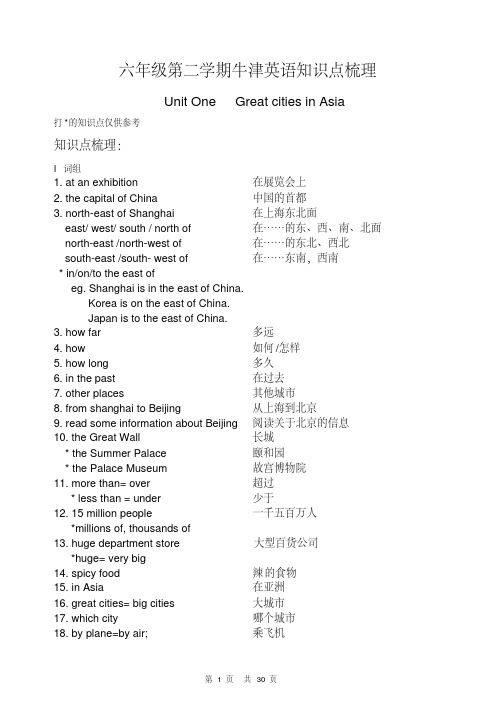
六年级第二学期牛津英语知识点梳理Unit One Great cities in Asia打*的知识点仅供参考知识点梳理:I 词组1. at an exhibition 在展览会上2. the capital of China 中国的首都3. north-east of Shanghai 在上海东北面east/ west/ south / north of 在……的东、西、南、北面north-east /north-west of 在……的东北、西北south-east /south- west of 在……东南,西南* in/on/to the east ofeg. Shanghai is in the east of China.Korea is on the east of China.Japan is to the east of China.3. how far 多远4. how 如何/怎样5. how long 多久6. in the past 在过去7. other places 其他城市8. from shanghai to Beijing 从上海到北京9. read some information about Beijing 阅读关于北京的信息10. the Great Wall 长城* the Summer Palace 颐和园* the Palace Museum 故宫博物院11. more than= over 超过* less than = under 少于12. 15 million people 一千五百万人*millions of, thousands of13. huge department store 大型百货公司*huge= very big14. spicy food 辣的食物15. in Asia 在亚洲16. great cities= big cities 大城市17. which city 哪个城市18. by plane=by air; 乘飞机by ship=by sea; 乘船by train/ ferry 乘火车/ 渡轮19. That’s right. 对的。
牛津版六年级英语下—U10同步—阅读综合—听力—作文
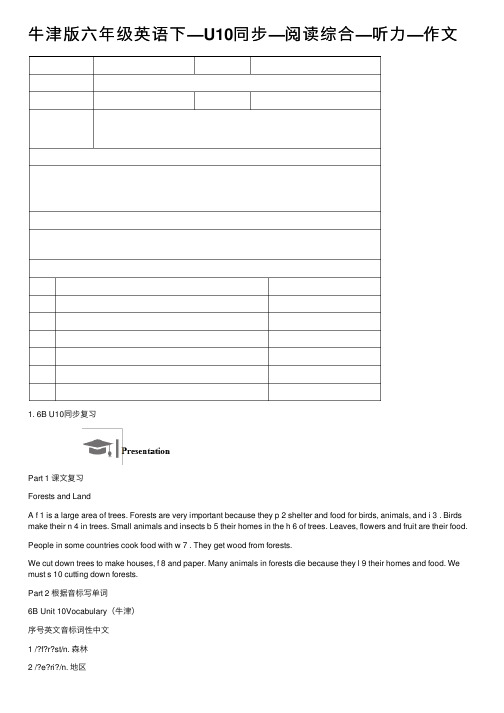
⽜津版六年级英语下—U10同步—阅读综合—听⼒—作⽂1. 6B U10同步复习Part 1 课⽂复习Forests and LandA f 1 is a large area of trees. Forests are very important because they p 2 shelter and food for birds, animals, and i 3 . Birds make their n 4 in trees. Small animals and insects b 5 their homes in the h 6 of trees. Leaves, flowers and fruit are their food. People in some countries cook food with w 7 . They get wood from forests.We cut down trees to make houses, f 8 and paper. Many animals in forests die because they l 9 their homes and food. We must s 10 cutting down forests.Part 2 根据⾳标写单词6B Unit 10Vocabulary(⽜津)序号英⽂⾳标词性中⽂1 /?f?r?st/n. 森林2 /?e?ri?/n. 地区3 /pr??va?d/v. 供给4 /b?ld/ v. 建造5 /w?d/ n. ⽊头6 砍倒7 /?f?:n?t??(r)/ n. 家具8 ⼀件家具9 /w?l/ n. ⽺⽑10 /?k?tn/ n. 棉花11 /?pl?st?k/ n.&adj. 塑料(的)12 /??l / n. 油;⽯油13 /?metl /n.&adj. ⾦属(的)14 /gra?nd / n. ⼟地15 /s?nd/ n. 沙16 /m??t??ri?l/ n. 材料Part 3 词汇语法复习⼆、6B U10词汇与知识点整理1.area n. 地区,区域We are going to build a school in this area.我们准备在这个区域内建⼀所学校。
牛津英语六年级上册第10单元知识点归纳

Unit 10 Healthy eating1. healthy eating 健康的饮食2. good diets and bad diets 好的食谱和不好的食谱3. a food pyramid 一个食物金字塔4. need a little fat, salt and sugar 需要一点脂肪,盐和糖5. some yogurt 一些酸奶6. plenty of 大量的,充足的7. fresh fruit and vegetables 新鲜的水果和蔬菜8. be unhealthy 不健康的9. have an unhealthy diet 有不健康的食谱10. do no exercise 不做运动11. be fit and healthy 健康的12. live in the countryside 住在乡村13. stay with sb. 和某人呆在一起14. become fit and healthy 变得健康的15. have some porridge for breakfast 早餐吃些粥16. be healthier than 比。
健康17. be less health than 不如。
健康18. be as healthy as 像。
一样健康19. be as unhealthy as 像。
一样不健康20. as…as 像。
一样;如同21. one…the other 一个。
另一个22. good eating habits 良好的饮食习惯23. do a quiz 做一个小测试24. should do sth. 应该做某事25. should not do sth. = shouldn’t do sth. 不应该做某事26. some suggestions for good eating habits 良好的饮食习惯的一些建议知识点:1. Shall we have a picnic tomorrow?=Let‟s have a picnic tomorrow.明天我们野餐怎么样?/我们明天去野餐吧!Shall we…?/ Let‟s用于提出建议。
沪教版六年级英语下册(上海牛津6B)知识点总结
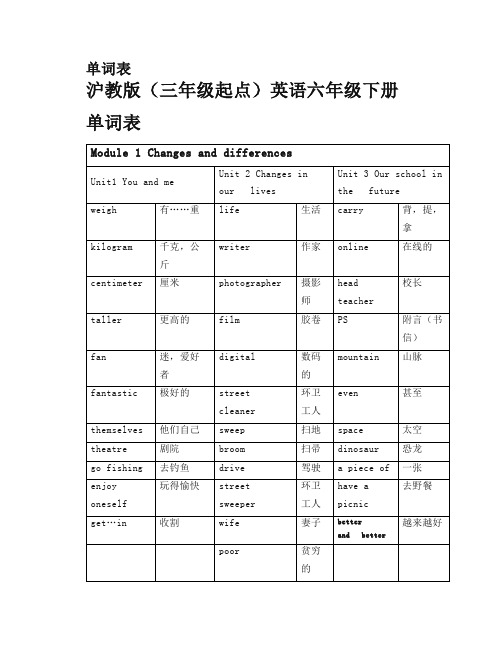
lazy
懒惰的
take off
脱掉
roof
屋顶
yard
院子
hit
碰撞
see the world
见世面
one by one
一个接一个地
look out of
往外看
even
甚至
themselves
他们自己
sweep
扫地
space
太空
theatre
剧院
broom
扫帚
dinosaur
恐龙
go fishing
去钓鱼
drive
驾驶
a piece of
一张
enjoy oneself
玩得愉快
street sweeper
环卫工人
have a picnic
去野餐
get…in
收割
油
craft
手艺,工艺
long race
长跑
oil painting
油画
crown
王冠
short race
短跑
powerful
强有力的
scissors
剪刀
win
获胜
ink
墨水
tape
胶带
long jump
跳远
brush
画笔,刷子
glue
胶水
high jump
跳高
paints
绘画颜料
saw
锯
swimsuit
kilogram
千克,公斤
writer
作家
online
在线的
centimeter
厘米
photographer
牛津6BUnit6-unit10知识点梳理
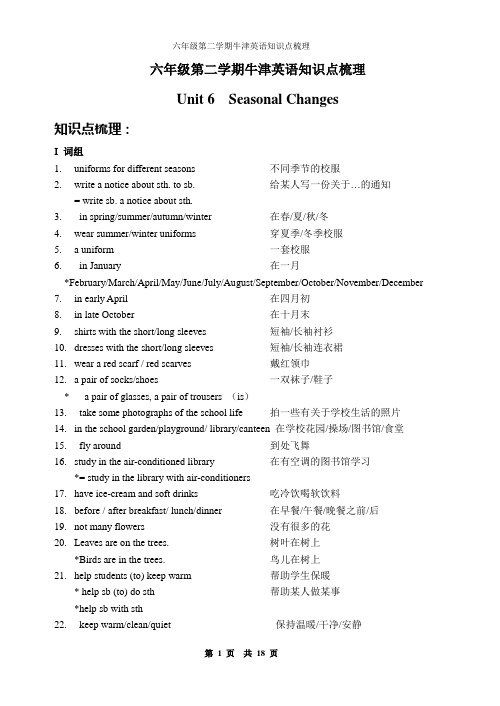
六年级第二学期牛津英语知识点梳理Unit 6 Seasonal Changes知识点梳理:I 词组1.uniforms for different seasons 不同季节的校服2.write a notice about sth. to sb. 给某人写一份关于…的通知= write sb. a notice about sth.3.in spring/summer/autumn/winter 在春/夏/秋/冬4.wear summer/winter uniforms 穿夏季/冬季校服5. a uniform 一套校服6.in January 在一月*February/March/April/May/June/July/August/September/October/November/December7.in early April 在四月初8.in late October 在十月末9.shirts with the short/long sleeves 短袖/长袖衬衫10.dresses with the short/long sleeves 短袖/长袖连衣裙11.wear a red scarf / red scarves 戴红领巾12. a pair of socks/shoes 一双袜子/鞋子* a pair of glasses, a pair of trousers (is)13.take some photographs of the school life 拍一些有关于学校生活的照片14.in the school garden/playground/ library/canteen 在学校花园/操场/图书馆/食堂15.fly around 到处飞舞16.study in the air-conditioned library 在有空调的图书馆学习*= study in the library with air-conditioners17.have ice-cream and soft drinks 吃冷饮喝软饮料18.before / after breakfast/ lunch/dinner 在早餐/午餐/晚餐之前/后19.not many flowers 没有很多的花20.Leaves are on the trees. 树叶在树上*Birds are in the trees. 鸟儿在树上21.help students (to) keep warm 帮助学生保暖* help sb (to) do sth 帮助某人做某事*help sb with sth22.keep warm/clean/quiet 保持温暖/干净/安静23.make snowmen (a snowman)堆雪人II. 词性转换1. seasonal (adj.) -- season (n.)There are four seasons in a year.Strawberries are seasonal fruit.2. change ( n. v. ) -- *changeable (adj.)Please change the sentence into English.Here is your change, sir.The weather is very changeable in Tibet.3. shorts ( n.)--short ( adj.)Boys must wear shorts and T-shirts in summer.In summer, the days are long and the nights are short.可数:*生命save my life *lives (pl.)4. life n.不可数:生活school lifelive (v.)*living adj. (定语) *alive adj. (表语)The farmer and his wife live happily in their hut and they enjoy their happy life very much.The hero who has saved his life is still alive.5. air-conditioned (adj.) air-conditioner (n.)The library isn’t air-conditioned now because there is something wrong with the air-conditioner.III. 语言点/句型1. Boys must wear white shirts with the short sleeves.2. Many flowers grow in the garden.3. Not many students like playing in the playground because it’s hot.Unit 7 Travelling in Garden City知识点梳理:I 词组:1.traveling in Garden City 花园城的出行2.travelling by bus∕ferry∕underground 乘公共汽车/渡船/地铁出行3. a single-decker bus 一辆单层汽车4. a double-decker bus 一辆双层汽车5. a fare box 一个投币箱6. a public transportation card 一张公共交通卡7.an air-conditioned bus 一辆空调车8.in the past 在过去9.in 10 years’ time 十年后10.all passengers 所有的乘客11.buy tickets from 从……买票12.collect money from the passengers 从乘客那里收钱13.have to do sth.(don’t have to do sth.) 不得不;必须(不必)14.put their money in a fare box 把钱放进投币箱e sth. instead 用……替代16.all of 全部的……17.most of 大部分的……18.some of 一些……19.none of 没有一个……20.be like 像……21.fewer traffic jams 少一些交通阻塞22.more underground stations 更多的地铁站23.light rail 轻轨24.traffic lights 交通灯25.car parks 停车场26.discuss sth. with sb. 和…讨论27.*think about 考虑;思考;想一想28.*kinds of transport 交通方式29.*make a poster about 制作一张有关……的海报II. 词性转换1. travel v. 旅行—travelling n. 交通—﹡traveller n. 旅行者e.g. Travelling in Shanghai will be more and more convenient.The Bund attracts many travelers to take photos there.2. conductor n. 售票员—*conduct v. 指挥,进行e.g. The manager asked him to conduct the meeting3. collect v. 收集—collection n. 收集e.g. Mr. Grey is interested in art and he has a large collection of paintings.4. driver n. 司机—drive v. 驾驶e.g. My father drives me to school every day.5. crossing n. 十字路口—cross v. 穿过—across prep. 越过e.g. Don’t cross the road when the traffic light is red.The old lady was walking across the road carefully.6. discuss v. 讨论—discussion n. 讨论e.g. We had a discussion on language and communication7. air-conditioned adj. 有空调设备的—air-conditioner n. 空调e.g. He's going to install an air-conditioner in the house.8. park v. 停车—park n. 公园/停车库e.g. I have to look for a car park to park my car.9. little adj. 很少的—less (比较级) 更少的e.g. He promised to have less fast food to keep healthy.10. few adj. 很少的—fewer (比较级) 更少的e.g. Helen made a few mistakes in her test paper. But Jane made fewer than her.11. many ∕much adj. 许多的—more (比较级) 更多的e.g. Nowadays you can find more tall buildings in Shanghai.III. 语言点/句型1. What will travelling in our city be like in 10 years’ time?=How will travelling in our city be in 10 years’ time?What …be like? …怎么样?be like∕look like 中like prep. 像…一样e.g. Our school is like a garden. like prep. 像…一样She looks like her mother.He likes reading detective stories, like v. 喜欢2. in 10 year s’ time =in 10 years 十年后(常与一般将来时连用)◆in one year’s time◆用How soon 提问e.g. The young man will finish riding around the country in two years’ time.How soon will the young man finish riding around the country?3. there be 句型表示事物的存在在什么地方有什么一般现在时:There is∕are一般过去时:There was∕were一般将来时:There will be/ There is going to be4. all of∕most of∕some of∕none of◆all of∕most of∕some of做主语时,后面的名词为复数,谓语动词也为复数e.g. All of the students wear school uniforms.◆none of做主语时,既可用复数谓语动词,也可用单数谓语动词e.g. None of us enjoy(s) getting up early.﹡复习one of的用法﹡可补充与both of∕either of∕neither of 的比较5. in the past∕nowadays∕in 10 years’ time分别与一般过去时,一般现在时,一般将来时连用e.g. In the past, people usually went to work by bike.Nowadays, people go to work by underground.In 10 years’ time, people will drive to work themselves.6. 比较级:little—less, few—fewer, many∕much—more◆fewer traffic jams∕less traffic7. have to do 不得不◆否定形式:don’t have to do = needn’t do∕don’t need to do 不需要e.g. I have to stay at home. I don’t have to stay at home.◆和must 的区别have to do —强调客观的需要,有人称,时态的变化must —强调主观的意愿,没有人称,时态的变化e.g. He broke his leg, so he had to lie in bed for several days.She must study hard, because she wants to be a doctor.8. perhaps= maybe, possibly 也许,可能9. travel by bus=take a bustravel by underground= take the underground10. instead和instead of◆instead单独用于句首句尾,是副词◆instead of 用于名词,代词或介词短语前e.g. I don’t like the red one, give me the black one instead.= Give me the black one instead of the red one.11. transportation n. (美)= transport n.(英)交通工具12. 动词与介词的搭配buy … from从…买collect … from从…收集put … in把…放入13. a woman driver— five wom e n driver sa man teacher— two m e n teacher s*a girl student — some girl studentsUnit 8 Windy weatherI 词组1.windy weather 有风的天气2.different kinds of 不同种类的3.make a display board 制作一个展板4. a gentle wind 一阵柔和的风5. a strong wind 一阵大风6. a typhoon 一阵台风7.see sb. doing sth 看见某人正做某事8.fly kites in the park 在公园里放风筝9.hold raincoats tightly 紧紧地抓住雨衣10.leaves blow slightly 树叶微微地吹动11.fly in the sky 在空中飞扬12.take flower pots into flats 把花盆拿进房间13.clouds move quickly 云快速地移动14.windsurf on the sea 在海上进行帆板运动15.on a windy day 在一个有风的日子16.fly kites happily 快乐地放风筝17.at first 起先18.blow gently 柔和地吹19.move slowly 缓慢地移动20.become stronger (风)变得更大了21.blow sth. away 吹走某物22.go home immediately 立刻回家23.blow fiercely 猛烈地吹24.fall down 倒下25.sink in the sea 在海里下沉26.pass quickly 快速地经过27.walk carefully in the street 街上小心地行走28.clean the street 清扫街道29.a slide show about typhoons 一个关于台风的幻灯片30.heavy objects 重物31.fall on cars 落在小汽车上32.break windows 打破玻璃窗33.flower pots outside people’s flats 人们屋外的花盆34.big waves in the sea 海里的大浪35.think about 思考;考虑36.may happen 可能发生37.when there is a typhoon 当有台风的时候38.sink ships and boats 沉没船只39.safety rules 安全规则40.stay at home 待在家中41.close all the windows 关闭所有的窗42.park cars in car parks把汽车停在停车场里43.fishing boats 渔船44.stay in typhoon shelters 待在台风庇护所里II. 词性转换1. windy a. 有风的wind n. 风windy weather/ days a gentle/ strong wind2. gentle a. 温和的gently ad. 温和地He is a gentle person.She gave me a gentle push.3. tightly ad. 紧紧地tight a. 紧紧的She kept her eyes tightly closed.You must hold the bottle tightly.4. slightly ad. 轻微地slight a. 轻微的The leaves blow slightly in the parksI know about him slightly.5. cleaner n. 清洁工人clean a. 干净的v. 清洁They saw some street cleaners cleaning the street.6. happily ad. 愉快地happy a. 快乐的happiness n. 快乐Kitty and Ben flew their kite happily.John lives happily because he always uses his time well for study.7. slowly ad. 缓慢地slow a. 缓慢的The clouds moved slowlyThe sky changed slowly from blue to red.反义quickly/ fast ad. 迅速地8. quickly ad. 迅速地quick a. 迅速的The clouds moved quickly.9. immediately ad. 立即immediate a. 立即的Kitty and Ben went home immediately.Stop smoking immediately.10. fiercely ad. 猛烈地fierce a. 猛烈的The wind became a typhoon and blew fiercely.11. carefully ad. 小心地careful a. 小心的,仔细的*care n./ v. 关心Please listen carefully and write down the sentences.反义carelessly ad. 不注意地,粗心地12. heavy a. 沉重的heavily ad. 沉重地13. safety n. 安全safe a. 安全的*safely ad. 安全地safety rulesmake our city a safe placearrive at home safely14. inside(反义)—outside15. fish n. 鱼v. 捕鱼fisherman ( fishermen) n.(复数) 渔民III. 语言点/句型1. What can you see when there is a gentle wind?有微风的日子里你能看到些什么?when,连词,意为―当……时‖ ,引导时间状语从句。
上海牛津6BUnit 10课件知识点
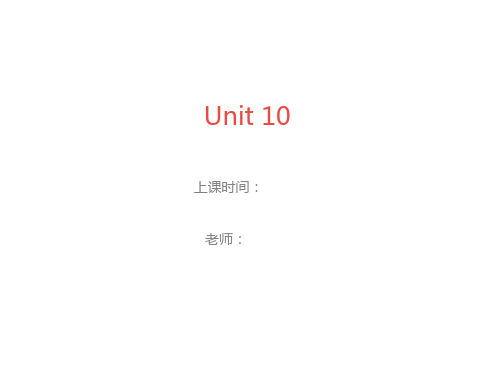
课中讲解 II 语言点/句型
2. find out 查明,弄清。 区分look for, find 和 find out (1) find 与find out 的区别:
find强调一种客观结果,意为“找到”
find out 指主观有意识的动作,意为“查明真相”
课中讲解 I 词组
25. use glass to make bottles 用玻璃制作瓶子 26. be important to 对……重要
课中讲解 II 句型
1. We get… from.. 2. We can use … to make … 3. -- What is it made of? --It’s made of .. 4. – How does it fell? -- It’s hard and rough/ soft/ smooth.
用…来做
e.g. People use bamboo for building. 人们用竹子做建筑材料
4. ----What can we use glass to make?
----We can use glass to make bottles.
----- What can we use … to make?
Unit 10
上课时间: 老师:
Homework
( )1. Please write_______ report on the poster.
A. an B. / C. a D. the
( ) 2. Man on the earth for millions of years.
A. began to live B. livedC. has lived D. have lived
沪教版英语6B单元知识梳理【范本模板】

上海牛津版6B英语课本知识点梳理课本知识梳理U1单词亚洲Asian 亚洲人亚洲人的亚洲的2.Japan 日本Japanese 日本人日本人的日本的3.north—east 东北north—west 西北south—east东南south-west西北4.Capital the capital city of Shandong province 山东的省会城市5.Exhibition 名词展览会exhibit 动词展览rmation inform动词告知通知7.Palace place 注意区别Summer Palace 颐和园8.Tourist tour 名词和动词旅游our guide 导游visitor 参观者passenger 乘客9.Kilometer kilogram公斤千克centimeter 厘米meter 米lion thousand千hundred百billion 十亿millions of 好几百万的 3million 三百万11.Building build动词build a house 建房子12.Huge large big 大13.Famous well—known 同义词形容词有名的fame 名词名声名誉词组名词词组1.great cities in Asia 亚洲的大城市city cities 变复数区分trolleys2.different cities 不同的城市3.the capital of 。
.的首都。
的省会城市the capital city of4.which city 哪个城市?5.other places 其他的地方other 后加可数名词复数other students 其他的学生6.another place 另外一个地方another 后加可数名词单数another student另外一个学生7.the table above 上面的表格8.some information about information不可数不加s 关于什么的消息9.the Great Wall 长城the不能省略专有名词首字母要大写10.15 million people 一千五百万人数字加million 不加s11. a lot of tall buildings 很多高楼buildings 不要忘记加s12.huge department stores 大型百货商店13.famous hotels 著名宾馆14.spicy food 辛辣食物15.beautiful beaches 漂亮的海滩16.quiz card 测试卡17.one and a half hours one hour and a half 一个半小时注意an hourand a half 关于几个半都是五个单词可数名词的复数的位置不同而已动词词组18.look at the map 看地图19.travel to sp go to sp 去某地20.ask and answer the questions 问答问题21.read some information about 阅读关于.。
上海牛津版英语六年级下册6BUnit10U10同步讲义

学员编号:年级:课时数:学员姓名:辅导科目:英语学科教师:授课类型TUnit10(牛津6下)基础知识梳理教学目标1、使学生能够基本掌握牛津6年级下册Unit10中的基础词汇及重要句型;2、使学生对本单元的知识点会综合运用并掌握相关试题的解题方法。
星级★★★授课日期及时段T同步-U10基础知识梳理(建议2-5分钟)A forest is a large area of trees.Forests are very important.Birds make their nests intrees.Small animals and insectsbuild their homes in thehollows of the trees.People in poor countries burn wood as fuel.We cut down trees to make furniture andpaper.除了上面的,森林和土地还有什么作用呢,让我们继续往下看吧~~(建议20-25分钟)一、词汇Words1. forest n. 森林e. g. -Forests are home to many animals and plants.森林是许多动植物的家园。
-We must take care of our forests.我们必须爱护我们的森林。
批注:forest是可以用复数的,提醒学生注意课文标题,forests and land2. hollow n.凹地,穴,洞e. g. the hollow of the hand手心the hollow of the tree树洞3. area n.地区;区域e. g. We are going to build a school in this area.我们准备在这个区域内建一所学校。
In some areas, there are small schools for a few farm families, and the children walk to school.有些地区,设有小规模的学校为少数几个农民家庭服务,孩子们走着去上学。
上海牛津英语6B知识点梳理(word文档良心出品)

六年级第二学期牛津英语知识点梳理Module 1 City lifeUnit1 Great cities in Asia知识点梳理:I 词组1. at an exhibition 在展览会上2. the capital of China 中国的首都3. north-east of Shanghai 在上海东北面east/ west/ south / north of 在……的东、西、南、北面north-east /north-west of 在……的东北、西北south-east /south- west of 在……东南,西南* in/on/to the east ofeg. Shanghai is in the east of China.Korea is on the east of China.Japan is to the east of China.3. how far 多远4. how 如何/怎样5. how long 多久6. in the past 在过去7. other places 其他城市8. from shanghai to Beijing 从上海到北京9. read some information about Beijing 阅读关于北京的信息10. the Great Wall 长城* the Summer Palace 颐和园* the Palace Museum 故宫博物院11. more than= over 超过* less than = under 少于12. 15 million people 一千五百万人*millions of, thousands of13. huge department store 大型百货公司*huge= very big14. spicy food 辣的食物15. in Asia 在亚洲16. great cities= big cities 大城市17. which city 哪个城市18. by plane=by air; 乘飞机by ship=by sea; 乘船by train/ ferry 乘火车/ 渡轮19. That’s right. 对的。
2020年沪教牛津版英语六年级下册unit10 -12 知识点复习资料
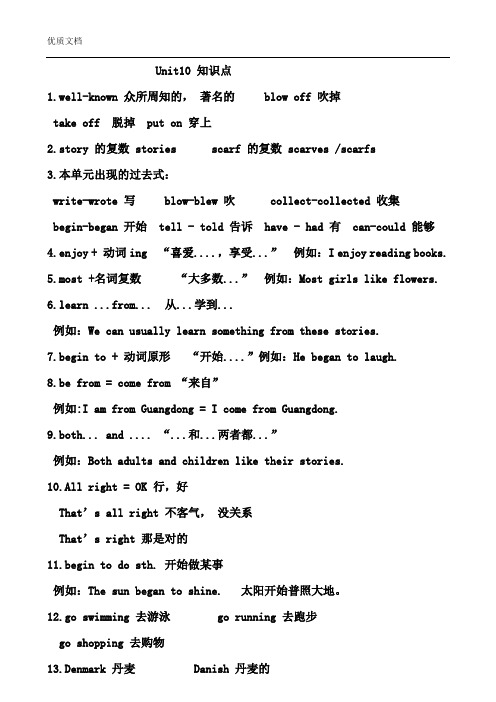
Unit10 知识点1.well-known 众所周知的,著名的 blow off 吹掉take off 脱掉 put on 穿上2.story 的复数 stories scarf 的复数 scarves /scarfs3.本单元出现的过去式:write-wrote 写 blow-blew 吹 collect-collected 收集begin-began 开始 tell - told 告诉 have - had 有 can-could 能够4.enjoy + 动词ing “喜爱....,享受...”例如:I enjoy reading books.5.most +名词复数“大多数...”例如:Most girls like flowers.6.learn ...from... 从...学到...例如:We can usually learn something from these stories.7.begin to + 动词原形“开始....”例如:He began to laugh.8.be from = come from “来自”例如:I am from Guangdong = I come from Guangdong.9.both... and .... “...和...两者都...”例如:Both adults and children like their stories.10.All right = OK 行,好That’s all right 不客气,没关系That’s right 那是对的11.begin to do sth. 开始做某事例如:The sun began to shine. 太阳开始普照大地。
12.go swimming 去游泳 go running 去跑步go shopping 去购物13.Denmark 丹麦 Danish 丹麦的Germany 德国 German 德国的14.形容词的比较级:在英语中,两者做比较时,形容词要用比较级,一般是在形容词的后面加er, 例如:taller, stronger , bigger,也有一些不规则的变化,例如:good--better ,比较对象通常用than 引出来,例如:I am stronger than you.15.英语句型阅读中升调和降调的规律:陈述句一般用降调;特殊疑问句一般用降调,回答也用降调;一般疑问句一般用升调,回家用降调。
上海牛津英语六年级第二学期笔记U10笔记.ppt

23 n. wood wool plastic use help beauty friend love
a. wooden woollen plastic useful / useless helpful / helpless beautiful friendly lovely
• 9、春去春又回,新桃换旧符。在那桃花盛开的地方,在这醉人芬芳的季节,愿你生活像春天一样阳光,心情像桃花一样美丽,日子像桃子一样甜蜜。 2020/7/242020/7/24Friday, July 24, 2020
1) make nests in trees
2) The birds are singing in the trees.
3) We can see apples on the trees.
4) There are a lot of green leaves on the trees.
16, *get … from… 从,,,得到,, The Chinese children always get some money ____ their parents. * borrow … from…从,,借到,, If you need a knife, you can borrow one ___ your teacher.
* We can use glass to make bottles. What can we use glass to make?
$$$ we use wood to make paper. =we make paper with wood.
20.* make : 制造 make paper, make cups make plates, make clothes * make: make a mistake 犯错 make a noise 弄出噪音 make tea 泡茶 make progress 取得进步 *make sb. +形容词 make me happy * make sb. do make us run around the playground
- 1、下载文档前请自行甄别文档内容的完整性,平台不提供额外的编辑、内容补充、找答案等附加服务。
- 2、"仅部分预览"的文档,不可在线预览部分如存在完整性等问题,可反馈申请退款(可完整预览的文档不适用该条件!)。
- 3、如文档侵犯您的权益,请联系客服反馈,我们会尽快为您处理(人工客服工作时间:9:00-18:30)。
牛津版英语六年级第二学期知识点梳理
Unit 10
知识点梳理:
I. 词性转换
1.leaf (pl.)—leaves
2.build (v.)—building (n.) –*builder (n.)
3.wood (n.)—wooden (a.)
4.furniture ( uncountable noun) *a piece of furniture
5.die (v.)—dead (a.)
6.lose (v.)-- *loss (n.) –* lost (a. )
7.plastic (n.)—plastic (a.)
8.wool (n.)— woollen (a.)
9.glass (n.)— a pair of glasses
10.hard (a.) – hard (ad.)
11.feel (v.)—* feeling (n.)
II. 词组
1.cut down trees to make houses 砍下树木来造房子
2.stop doing sth. 停止做某事
e sth. to do sth. = use sth for doing 用…来做
4.provide sth. for sb./ sth =provide sb. with sth. 给某人提供某物
5.be made of 由…制成
6.*be made from 由…制成
7.*be made up of 由…组成
8.make a display board 制作一块展览板
9.read some information about forests 阅读一些关于森林的信息
10.a large area of trees 一大片的树木
11.provide shelter and food for..为……提供居所和食物
12.make nests in trees 在树上筑巢
13.cook food with wood 用木头做饭
14.get wood from forests 从森林得到木头
e wood to make paper用木材制纸
16.get plastic from oil 从石油中获取塑料
e plastic to make cups 用塑料制作杯子
18.get wool from sheep 从羊身上获得羊毛
19.get cotton from plants 从植物获得棉花
e wool and cotton to make clothes用羊毛和棉花做衣服
21.get oil, metal and clay from the ground 从土地获取石油
e metal to make spoons 用金属制作勺子
e clay to make plates 用粘土制作盘子
24.get glass from sand 从沙石中获取玻璃
e glass to make bottles用玻璃制作瓶子
26.be important to 对……重要
III. 句型
1. We get… from..
2. We can use … to make …
3. -- What is it made of?
--It’s made of ..
4. – How does it fell?
-- It’s hard and rough/ soft/ smooth.
IV. 语言点/句型
1. provide sth. for sb. 为某人提供某物
e.g. This restaurant can provide food for 300 people.
这个饭店可以提供300人食物。
此词组还有另外表达方法:provide sb. with sth.
e.g. Trees provide us with wood.
树提供给我们木头。
2. find out 查明,弄清。
区分look for, find 和find out
(1)find 与find out 的区别:
find强调一种客观结果,意为“找到”
e.g. I can’t find my glasses. 我找不到我的眼睛
find out 指主观有意识的动作,意为“查明真相”
e.g. I want to find out who has taken away my glasses.
(2) find out 与look for 的区别:find out (找出、查明)的通常是抽象的事因、复杂的真相等。
look for(寻找)的通常是具体事务
e.g. I am looking for my glasses.
3. use sth. to do sth. 用...做...
e.g. We use wood to make paper and furniture. 我们用木材造纸和家具
We use pans to cook food. 我们用锅做饭。
use sth. to do sth. = use sth for doing sth. 用…来做
e.g. People use bamboo for building.
人们用竹子做建筑材料
4. ----What can we use glass to make?
----We can use glass to make bottles.
----- What can we use …to make?
----- We can use ____ to make _____.
5. 1)be made of 意为“由…制成”。
指能看出原材料。
e.g. What’s the skirt made of? 这条裙子是由什么制成的?
The chair is made of wood. 这把椅子是由木头制成的。
2)be made from 意为“由…制成”。
指看不出原材料。
e.g. Paper is made of wood. 纸是由木头制成的。
此外,be made in 意为“在…….地方制造”,后接表示人的名词或代词
e.g. This cake is made by my mother. 这蛋糕是我妈妈做的。
3) be made into 意为“(某物)被制成……”
e.g. Metal can be made into all kinds of things. 金属可以制成各种各样的物品。
6.形容词的构成:名词加上词缀变成形容词。
本文中有的表示材料的名词加上特定的后
缀变为形容词。
1)名词+en,表示由……制成。
如wool 变成woollen, wood 变成wooden, gold 变成golden。
2)名词+ful, 如,beauty变成beautiful, care 变成careful, help 变成helpful。
3)名词+less, 表示”无,没有”。
如use 变成useless, care 变成careless。
4)名词+y, 如:sun 变成sunny, fun 变成funny, cloud 变为cloudy等。
7.How does it feel?
It’s hard/rough/soft/smooth
What is it made of?
It’s made of__________
What is it?
It’s a wooden/woollen/cotton/metal/clay/plastic/glass_________。
